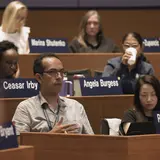
A ‘Truly Remarkable’ Visit to a Yale Treasure
Tamaan Osbourne-Roberts ’23 reflects on lessons learned from the Frederick Douglass collection at the Beinecke Rare Books & Manuscripts Library, which he visited during a recent EMBA class weekend in New Haven.
One recent weekend, I had the chance to do something truly remarkable.
One of the many perks of studying at a world-class institution is having access to world-class cultural repositories. At Williams, it was the Clark Art Institute (which I did eventually get to, the week before graduation…). There are probably a few candidates for this honor at Yale, but for me, the most prominent amongst them is the Beinecke Rare Books & Manuscripts Library.
I’m rather partial to libraries. As a child, they were a safe space, a refuge for a gentle, awkward Black boy who used to spend hours with his mother’s National Geographic magazines, and reading through his family’s encyclopedias for fun. It also means something to me that librarians have been, for the most part, consistently kind to me. But even among libraries, the Beinecke is special, world renowned both as a repository for rare books and documents, as well as an architectural wonder. And with an extra-long lunch on a recent class weekend, I made an appointment to review one of their most special collections: a series of writings, letters, and ephemera from none other than Frederick Douglass himself. They were easily the most significant documents I’ve ever handled—and full of lessons. To summarize just a bit of that collected wisdom:
- Even in his letters to friends and family, his voice is clear, distinctive, and unflinching. He does not apologize for who he is, nor for his fearsome intelligence, nor his prodigious capabilities, nor for the power of his narrative. As someone who has struggled with the strength of my own voice, this was instructive.
- His letters and speeches were liberally seasoned with edits and emendations, including a charming pair of letters in which, having requested a meeting with a fellow abolitionist on the wrong date, Mr. Douglass had to write his friend back just six days later, acknowledging his “blunder” (his words!) and requesting a new meeting date! For lack of a better way of putting it, it was very much a “reply all” moment (that is, had email been a feature of that time). Seeing one of the greatest of American minds make corrections and struggle with organizing his schedule was a reminder to accept my own mistakes with more grace.
- While the collection had many notable documents, some of the most endearing items were a note replying to his grandson, who had written him to thank “Grandpa” for the gift of a new flute, and his household expense ledger, written in his own beautiful hand. These two documents were incredibly humanizing. For all the weight of history that his legacy carries, he was a human being, with loved ones, responsibilities, and all the regular demands of life. And even with these sorts of daily concerns, he managed to change the world.
It was an incredible afternoon. I hope to return soon.



